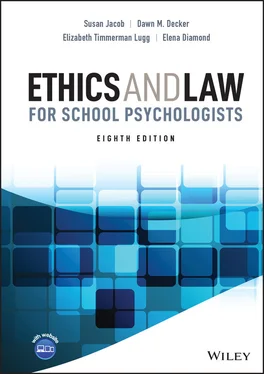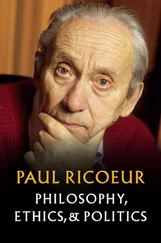Susan Jacob - Ethics and Law for School Psychologists
Здесь есть возможность читать онлайн «Susan Jacob - Ethics and Law for School Psychologists» — ознакомительный отрывок электронной книги совершенно бесплатно, а после прочтения отрывка купить полную версию. В некоторых случаях можно слушать аудио, скачать через торрент в формате fb2 и присутствует краткое содержание. Жанр: unrecognised, на английском языке. Описание произведения, (предисловие) а так же отзывы посетителей доступны на портале библиотеки ЛибКат.
- Название:Ethics and Law for School Psychologists
- Автор:
- Жанр:
- Год:неизвестен
- ISBN:нет данных
- Рейтинг книги:3 / 5. Голосов: 1
-
Избранное:Добавить в избранное
- Отзывы:
-
Ваша оценка:
- 60
- 1
- 2
- 3
- 4
- 5
Ethics and Law for School Psychologists: краткое содержание, описание и аннотация
Предлагаем к чтению аннотацию, описание, краткое содержание или предисловие (зависит от того, что написал сам автор книги «Ethics and Law for School Psychologists»). Если вы не нашли необходимую информацию о книге — напишите в комментариях, мы постараемся отыскать её.
Ethics and Law for School Psychologists
Ethics and Law for School Psychologists
Ethics and Law for School Psychologists — читать онлайн ознакомительный отрывок
Ниже представлен текст книги, разбитый по страницам. Система сохранения места последней прочитанной страницы, позволяет с удобством читать онлайн бесплатно книгу «Ethics and Law for School Psychologists», без необходимости каждый раз заново искать на чём Вы остановились. Поставьте закладку, и сможете в любой момент перейти на страницу, на которой закончили чтение.
Интервал:
Закладка:
In Chapter 1, we discussed the goals of ethics training for school psychologists and provided a list of desired ethical-legal competencies. Several additional competencies specific to law are identified here. Competent school practitioners are alert to situations that involve legal issues, and seek consultation with knowledgeable supervisors (or, when appropriate, with experts on mental health law) when legal questions arise. They strive to make informed decisions that are respectful of student and parent legal rights and the legal rights of others, and they ensure that parents, students, and other clients understand their legal rights in the school setting. They recognize that law impacting public schools is complex and that misunderstandings of contemporary school law are not uncommon (Zirkel, 2012). When anticipated or real school administrative policies, practices, or decisions appear contrary to what the law deems appropriate, school practitioners raise questions through appropriate administrative channels after first “checking the facts” by consulting authoritative sources. Finally, school psychologists recognize that their actions may come under public scrutiny in a due process hearing, U.S. DOE OCR complaint investigation, or in court. They engage in actions that safeguard the legal rights of students and others; make decisions that are in compliance with law and with sound professional practices and that foster trust in school psychologists; and they document the decisions made and the basis for those decisions.
CREDENTIALING OF SCHOOL PSYCHOLOGISTS
As part of the obligation to protect the health and welfare of their citizens, state governments enact laws to regulate the provision of psychological services. State credentialing of professionals, such as school psychologists, protects the consumer by requiring individuals to hold specified qualifications before they are granted a legal sanction to practice in the state.
Credentialing for School-Based Practice
In most states, the state (SDE) credentials school psychologists for practice in the school setting. The credential issued by the SDE may be called a “certificate,” “endorsement,” or “license” (Rossen, 2014). An SDE credential generally permits school-based practice only; that is, the practitioner may work for the schools either as a regular school employee or on a contractual basis, but the credential typically does not authorize a school psychologist to engage in private practice. An SDE credential is the state credential most commonly held by school psychology practitioners (Walcott et al., 2018).
The credentialing of school psychologists for school-based practice is a state matter. The highest degree required for an SDE credential is the specialist degree (about 60 credit hours); no state currently requires a doctorate (Rossen, 2014). Although commonalities in credentialing standards exist across states, equivalence of requirements between states is the exception rather than the rule. Furthermore, different states may use different titles or designations (e.g., “school psychologist,” “school diagnostician”), and some states have more than one level of SDE credential, depending on the level of graduate preparation and years of experience.
Fagan and Wise (2007) identified two models of SDE credentialing: transcript review and program approval . Transcript review requires submission of transcripts and other supporting materials to a state credentialing agency. The agency then determines whether the applicant successfully has completed the prescribed set of courses and field experiences outlined in the SDE’s credentialing standards. The program approval process means that applicants who have the recommendation from an approved state training program will be credentialed by the SDE. The procedure used for SDE credentialing may be different for applicants from in-state training programs and those from out-of-state programs. (See Rossen, 2014).
Because credentialing is controlled at the state level, students and practitioners need to contact the state in which they wish to practice for up-to-date information about SDE requirements for credentialing. The NASP maintains a National School Psychology Certification and Licensure Online Resource List that provides a summary of the requirements for licensure and certification in various states (see https://www.nasponline.org/standards-and-certification/state-school-psychology-credentialing-requirements).
Credentialing for Private Practice
Licensure acts typically regulate the private practice of psychology. Licenses for the private practice of psychology usually are issued by a state psychology board or a board that regulates mental health providers (Rossen, 2014). Some states, but not many, license school psychologists for unsupervised private practice at the subdoctoral level; some states license school psychologists for private practice at the subdoctoral level but only if they are supervised by a fully licensed doctoral psychologist. See Rossen (2014) and DeMers and Schaffer (2012) for additional discussion. Information on licensing boards is available at https://www.nasponline.org/standards-and-certification/state-school-psychology-credentialing-requirementsand http://www.asppb.org.
Nonpractice Credentials
In addition to state credentials to practice, nonpractice credentials recognize the quality of professional preparation. The National School Psychology Certification System allows school psychologists who complete training consistent with NASP standards, who achieve a passing score on the National School Psychology Examination, and who meet continuing education requirements to be identified as a Nationally Certified School Psychologist (NCSP). More than 16,000 individuals hold the NCSP credential (NASP, n.d.-b). It is important to recognize that the NCSP title alone does not authorize a school psychologist to render services; practitioners must hold a valid certificate or license in the state where they wish to practice. However, 33 states “acknowledge, recognize, or accept the NCSP credential as either meeting or partially meeting requirements for the state school psychologist credential” (NASP, n.d.-b, p. 1). For more information, visit the NASP’s Web site at http://www.nasponline.org.
LAWSUITS AGAINST SCHOOLS AND SCHOOL PSYCHOLOGISTS
In the last portion of this chapter, we discuss lawsuits against schools and school psychologists.
Lawsuits against Schools under State Laws
Civil liability, simply stated, “means that one can be sued for acting wrongly toward another or for failing to act when there was a recognized duty to do so” (Hopkins & Anderson, 1985, p. 21). Civil liability rests within the basic framework of the law of tort. A tort is a civil (not criminal) wrong that does not involve a contract. It is a complex area of law. In general, the court considers four questions in tort cases: (1) Did injury occur? Injury means a wrong or damage done to the student’s person, rights, reputation, or property. (2) Did the school owe a duty in law to the student? (3) Was there a breach of duty? That is, did the school fail to do what it should have done? A tort can arise when either an improper act or a failure to act causes injury to the student. (4) Is there a proximate cause relationship between the injury and the breach of duty? (Evans, 1997).
The most common tort committed by school personnel is negligence (Evans, 1997). Negligence suits often are precipitated by a physical injury to a student (e.g., injury resulting from student-on-student violence). When a student suffers harm and their parents seek vindication in court, the parents are most likely to file a negligence lawsuit in state court (Schill, 1993). Such lawsuits generally allege that the school had a duty (under state common or statutory law) to protect students from foreseeable harm, had knowledge of a specific danger, negligently failed to take reasonable precautions to protect the student, and thus caused the injury by allowing the incident to occur (Schill, 1993; Wood & Chestnutt, 1995).
Читать дальшеИнтервал:
Закладка:
Похожие книги на «Ethics and Law for School Psychologists»
Представляем Вашему вниманию похожие книги на «Ethics and Law for School Psychologists» списком для выбора. Мы отобрали схожую по названию и смыслу литературу в надежде предоставить читателям больше вариантов отыскать новые, интересные, ещё непрочитанные произведения.
Обсуждение, отзывы о книге «Ethics and Law for School Psychologists» и просто собственные мнения читателей. Оставьте ваши комментарии, напишите, что Вы думаете о произведении, его смысле или главных героях. Укажите что конкретно понравилось, а что нет, и почему Вы так считаете.












